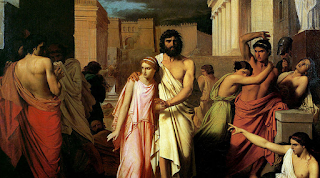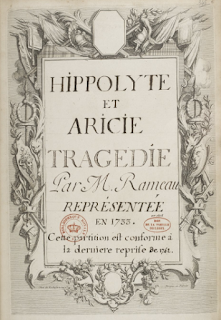Enescu - Œdipe
ONP Paris-Bastille, Thursday October 14 2021
The director, Wajdi Mouawad, who's in charge of the Théâtre National de la Colline, just up the hill from where I live, has apparently specialised in Sophocles. I haven't seen any of his work before, but can imagine that an abstract, timeless, placeless, approach, with simple, slow, ritualistic movements clears the stage, so to speak, for Sophocles. Sadly, instead of setting a direct translation from the Greek, Enescu used a stiff, creaking poem by Edmond Fleg, the kind of thing Sarah Bernhardt might have declaimed, and this reverent, 'hieratic' sort of staging emphasised the stiffness and curtailed, in my view, the drama and humanity of the work. It wasn't an out-and-out 'stinker', as I told someone who had asked me if it was, before coughing up to buy the video from the ONP's website. But it wasn't my cup of tea.
The production opened, before the music started, with an introduction, mimed on stage to a recorded voice, explaining why Laius was cursed: for the rape of the son of his host, Pelops. (Interestingly, so I read, his crime was not so much child rape itself as breaking the laws of hospitality - being a bad guest.) The reappearance of the child was one of several easy-to-read symbols woven through the fabric of the production for coherence. During the grisly rituals for the royal birth (apparently well researched; whether they really extended to human sacrifice, I don't know) much was made of Oedipus's long umbilical cord; later a long, shaggy red cord linked Jocasta's dress to the flies, another easy-to-grasp example. The Thebans' elaborate, floral headdresses withered with the plague, and their gleaming, monumental metal statues (reminiscent of Giacometti, but better-fed) tarnished.
Conductor: Ingo Metzmacher. Production: Wajdi Mouawad. Sets: Emmanuel Clolus. Costumes: Emmanuelle Thomas. Make-up, hairdressing and headwear: Cécile Kretschmar. Lighting: Éric Champoux. Video: Stéphane Pougnand. Œdipe: Christopher Maltman. Tirésias: Clive Bayley. Créon: Brian Mulligan. Le berger: Vincent Ordonneau. Le grand prêtre: Laurent Naouri. Phorbas/Le Veilleur: Nicolas Cavallier. Thésée: Adrian Timpau. Laïos: Éric Huchet. Jocaste: Ekaterina Gubanova. La Sphinge: Clémentine Margaine. Antigone: Anna-Sophie Neher. Mérope: Anne Sofie von Otter. Une Thébaine: Daniela Entcheva. Orchestra and Chorus of the Opéra National de Paris. Maîtrise des Hauts-de-Seine, Paris Opera children’s chorus.
I first saw Oedipe in Brussels, almost exactly ten years ago, and was impressed:
'This, for me, was a major discovery of the kind I haven’t made since Die tote Stadt or (to a lesser extent) Die Gezeichneten. It should appeal to anyone who enjoys large-scale, post-romantic tonal works, from the Gurrelieder to – even - 50s Britten, via Zemlinsky, Schreker, Korngold, Janacek, Canteloube, Hindemith, Respighi, Vaughan Williams, Delius and so on (and is probably a good deal better than at least one or two of those)'. I forgot, I now see, to include Walton in that list. I emerged wondering, like many people, why Oedipe isn't played more often. So I was quite excited, like many, to have it as the first work in my 'post-Covid' season.
Perhaps, after such a long, virus-induced absence from the opera house, I can no longer see or hear or think straight. The production has had mostly positive reviews (and my neighbours liked it), but I was disappointed and more in sympathy with the one-or-two less positive reports I've read since (I usually don't read reviews before seeing a production myself).
The director, Wajdi Mouawad, who's in charge of the Théâtre National de la Colline, just up the hill from where I live, has apparently specialised in Sophocles. I haven't seen any of his work before, but can imagine that an abstract, timeless, placeless, approach, with simple, slow, ritualistic movements clears the stage, so to speak, for Sophocles. Sadly, instead of setting a direct translation from the Greek, Enescu used a stiff, creaking poem by Edmond Fleg, the kind of thing Sarah Bernhardt might have declaimed, and this reverent, 'hieratic' sort of staging emphasised the stiffness and curtailed, in my view, the drama and humanity of the work. It wasn't an out-and-out 'stinker', as I told someone who had asked me if it was, before coughing up to buy the video from the ONP's website. But it wasn't my cup of tea.
 |
| Enescu |
I realise that a parti pris of timelessness and placelessness may be adopted to imply universal relevance; the risk is the result is just vagueness. There were some striking moments, above all the emergence of the Sphinx from a gleaming black, treacly, sticky-looking sewer-mouth, but overall, to me, the abstract, ritualistic approach, with its monolithic sets gliding about and uniform pastel-coloured, 'opera-costumes' for a chorus lined up in phalanxes, arms dangling, was too impersonal to bring any drama to life, and, frankly, old-fashioned: like a 70s or 80s Turandot, I thought, especially in the final Colonus act. (Opera-online.com had similar ideas: 'We thought these crowd movements had been forgotten since the 1980s, we thought that the advent of opera directing in France had made these "mock-tragic" postures - arms outstretched, hands open - disappear from the radar. We were obviously wrong.') The monumental monoliths, tall statues and big, square chunks of chorus tended to dwarf the soloists, and there were times when I wished they - Oedipus, in his plain black suit, especially - were actually given something to do: his action was largely limited to taking his jacket off and putting it back on again.
Singing Oedipus is a feat in itself. More forceful directing would have helped Christopher Maltman to develop a more nuanced, less monolithic-seeming character. He stood there and belted the taxing part out admirably, but was allowed to show limited psychological complexity. In a way, it was despite a directorial strait-jacket that his fate finally moved the audience at the end: of course, he got an ovation.
Clémentine Margaine was the other big 'winner' of the evening for her brief but strikingly insinuating appearance as the sphinx. Anne Sofie von Otter deserved a bigger hand, I thought, than she got, for bringing subtlety and musicality to her equally brief part (Oedipe is basically Oedipus throughout plus occasional extras), but the Bastille is a bad place for voices of her size, so perhaps people further back (I was on row 16) heard less of her.
Ekaterina Gubanova brought a degree of warmth and humanity to the role of Jocasta that seemed almost to clash with the anonymity of the production. In the rest of the cast, Clive Bayley and Nicolas Cavallier stood out, and I was sorry to find that Yann Beuron, sick, had dropped out of the role of Laïos, brief though that, too, is.
As I said above, it may be that after such a long break from regular opera-going, I can no longer see, hear or think straight. (I've got out of the habit of writing, as well: this report has been a struggle, with a series of false starts, and I'm afraid it must show). The press have said the Paris Opera orchestra and chorus were at their most magnificent under Ingo Metzmacher. Maybe I was just tired by the return to city life after two months in the Greek islands and out of phase with things in general, but to me the music-making sounded as stiff as the production, not as fluent as you'd expect at the end of a run.
I think I was perhaps better disposed for Lodewijk Mortelmans’ De Kinderen der Zee in concert at the Bozar in Brussels on Sunday. Watch this space...




Comments
Post a Comment